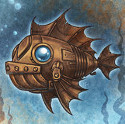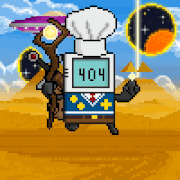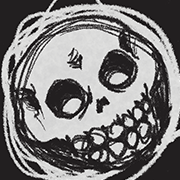|
Not a cube but Watery Sphere might be what you are looking for. https://www.dndbeyond.com/spells/watery-sphere It doesn't say anything about drowning the person that is restrained but I think that is a logical conclusion if they are restrained for X number of turns underwater. Maybe something to ask your DM. Looking into it a bit, most people suggest that you probably can't restrain a creature long enough for them to drown. MrSargent fucked around with this message at 18:54 on Jan 23, 2021 |
|
|
|

|
| # ? May 31, 2024 06:11 |
|
MrSargent posted:Not a cube but Watery Sphere might be what you are looking for. The incredibly rough rule of thumb that's easy to remember: two minutes without air, two days without water, two weeks without food. Drowning someone in a combat situation takes time.
|
|
|
|
MrSargent posted:Not a cube but Watery Sphere might be what you are looking for. I'm assuming this would also preclude verbal casting and make misty stepping out impossible too?
|
|
|
|
If anyone is wearing heavy armor they probably have a high enough Con score where drowning them is just not feasible (PHB p 183, 'Suffocating') Consider that rounds are generally understood to last around 6 seconds give or take. A goon can probably hold their breath for at least a minute. A person with actual training who is in good enough shape to move around in armor can probably hold their breath for several minutes, and after that it's not game over immediately either if one of their buddies frees them.
|
|
|
|
MrSargent posted:Since all of my players (and myself) are brand new to D&D and this is really the first dungeon they are going through, I don't think I am going to let anyone die yet. I just think that could exacerbate the problem of them being over-cautious with every action they take. Now I could definitely see someone getting knocked unconscious and I think that could definitely add a lot of tension without it being permanent. I forget where I first saw the idea, but there's a couple of games out there that have what's called a "death flag"; basically a little box, or chit, or something they can check off in order to show that "hey, this is important enough to me and/or my character I'm willing to have them possibly die for it" (and get a couple of extra little buffs, like a second wind, a small bonus to attack, etc. Of course, there's usually some sort of limitation to turning on the death flag, whether it can only be used in a life-or-death situation, or it can't be turned off for the rest of the session (or the rest of the campaign!) one activated, etc. If the player hasn't turned on their death flag, then they can only fall unconscious, never be killed. Now, as you say yourself, there's a lot of tension when someone is KO'd, let alone the whole party, so this may be something to consider putting in your game, as everyone is new, and presumably wanting to see their characters and their story stick around for the duration of the campaign. If this is something up your guys' alley, consider taking a little bit of time and working out with your group what kind of benefits and limitations you want to put on the death flag, so that way when someone turns it on it really feels like an "oh poo poo this just got serious" kind of moment, and isn't just spammed every fight to get a little extra DPS.
|
|
|
|
In last weeks encounter drowning was uh, a very real risk two of the party members were facing. They rolled swim checks at disadvantage (because of their armor) and then a con save for drowning. The implication I got was if I wasn't yanking them out of the water with my telekinetic pull/shove ability they absolutely probably would have drowned as they kept blowing their saves and couldn't get out. So I dunno what exactly the rules are but I got the impression that if I got like an ogre in a 20' cube they'd probably die without assistance.
|
|
|
|
TooMuchAbstraction posted:The incredibly rough rule of thumb that's easy to remember: two minutes without air, two days without water, two weeks without food. Drowning someone in a combat situation takes time. Close: https://en.wikipedia.org/wiki/Rule_of_threes_(survival)
|
|
|
|
I'm pretty sure I read that in game, a character can hold their breath for 1 minute + an extra minute for each point of CON modifier. The spell lasts 1 minute, so if you have a negative con value, yeah, it could drown someone.
|
|
|
|
when all else fails if youíre trying to be dramatic you can just say the exertion of combat (increased heartrate, blahblahblah) renders them more susceptible to falling unconscious from lack of oxygen or any other sudden change in environment doesnít matter if itís true or medically sound as long as you can get players to suspend their disbelief
|
|
|
|
MrSargent posted:Wanted to follow up on this because from reading the Unconscious condition, it says attack rolls have advantage, not that the automatically hit. If a hit lands though, it is an automatic critical. Is this the correct interpretation? That sounds like that makes sense and I'm sure that is how the rule is written but I'll flat out say that is dumb unless you are being actively distracted by something preventing you from attacking something that has no way of defending itself, but I suppose if it is in combat the general melee is enough to make people distracted If it was out of combat there ought be no need for a roll, I m o, rules be hecked Player death need not be something that has to happen but you could drag player characters away and now the others have to go rescue them. Keeping in mind general personality of monsters they might take the first ko'ed character through a side door and then tar and feather them because they are mean spirited but not necessarily bloodthirsty. Maybe they need the player for a dark ritual or something so they gotta keep them alive until they are dramatically sacrificed. Really draw that bit out so the other players have a chance to do the needful and a chance for the other player to break free and make a dating escape.
|
|
|
aldantefax posted:That sounds like that makes sense and I'm sure that is how the rule is written but I'll flat out say that is dumb unless you are being actively distracted by something preventing you from attacking something that has no way of defending itself, but I suppose if it is in combat the general melee is enough to make people distracted For the most part, failure in non-combat encounters is pretty well understood intuitively I've found. Attempting to pickpocket the key from the guard to break your target NPC out of jail has the potential for the NPC to get caught in the act, which will generally result in combat, additional guards being called, the jail going into lockdown, that sort of thing. It's pretty easy to communicate that to the players. Maybe the guard has a bell next to them, or a horn on their belt, maybe they saw patrols going around that could assist the jailer. The players will understand that they're taking a calculated risk, and when you give them a DC for the check based on how well they do their planning, they can choose whether or not to proceed. Most folks assume that failure in combat is that everyone dies, total party kill, module over, roll better next time, which is ... not a great approach even if it's a valid one that can be taken. I was given advice a while back to think about what happens if the party starts to lose any particular fight and how to handle that, and that's really helped me as a DM. Whether it's giving PCs a chance to disengage from the fight and go lick their wounds or giving the NPCs an incentive to capture the PCs vs. just offing them right on the battlefield gives me a lot of flexibility in creating a challenging combat encounter that doesn't have that "oh god, I spent a lot of time playing this character and I've become quite attached to them and now they're going to die this loving sucks" kind of risk. In my mind, player death should be a reward for doing something fantastically stupid after being warned that this might kill them or if not one fantastically stupid thing, the willful unheeding of multiple clear signs that they're getting in over their heads. The former is more "yes I know that our side is has just lost this massive battle and is retreating but instead of running away with my comrades, I'm going to charge headlong at their commander and try to kill them to turn the tide" and them agreeing after understanding that the enemy commander announced no quarter before the battle and that they will surely die if they fail. The latter is "the party nearly all died on the first random encounter in this cave, pushed on and almost died on the second encounter as well, was given a chance to retreat but instead of choosing to take it, decided to push on, which caused the NPC who helped keep them alive on the first two encounters tell them that they're going to die if they keep going and leave the party there". In both of those cases, it's clear the consequences of failure were made clear and if the party pressed on, they did so clearly knowing that it might result in the permanent death of their character and felt that to be a worthwhile risk.
|
|
|
|
|
aldantefax posted:That sounds like that makes sense and I'm sure that is how the rule is written but I'll flat out say that is dumb unless you are being actively distracted by something preventing you from attacking something that has no way of defending itself, but I suppose if it is in combat the general melee is enough to make people distracted I gotta agree with you, its silly that you can miss an attack on a completely motionless and defenseless creature. But the next issue that comes up is that the rules state any hit is an automatic critical. If its an automatic hit AND an automatic crit, that makes Sleep even more powerful than it already is. I think I am going to try out a variation of this. If a player attacks a creature that is unconscious, they get advantage on their attack roll. If the roll would have been a hit under normal circumstances, it is instead a critical hit. If the roll would have been a miss under normal circumstances, it is instead a normal hit. I think intuitively that makes a bit more sense while not being too overpowered but will have to test it in our next session as I am sure it will come up.
|
|
|
MrSargent posted:I gotta agree with you, its silly that you can miss an attack on a completely motionless and defenseless creature. But the next issue that comes up is that the rules state any hit is an automatic critical. If its an automatic hit AND an automatic crit, that makes Sleep even more powerful than it already is. I think I am going to try out a variation of this. I think it's worth remembering that "missing an attack" can mean more than swinging on a target and whiffing. A character wearing heavy armor has more attacks "miss" because some percentage of those attacks are in some way prevented by the armor despite the weapon making contact, not because the armor makes them more able to fully dodge attacks. When a character is lying on the ground, they still have the protection of that armor, and the attacker may still fumble their grip on their weapon or stumble while moving in to make the attack, get distracted by someone else charging them at the last moment, etc. so it's perfectly reasonable to "miss" an attack on a defenseless opponent. The attack having advantage and the hit being an automatic crit, to me at least, is a good simulation of "you're way more likely to connect and when you do connect, it will be a more solid connection".
|
|
|
|
|
MrSargent posted:I gotta agree with you, its silly that you can miss an attack on a completely motionless and defenseless creature. But the next issue that comes up is that the rules state any hit is an automatic critical. If its an automatic hit AND an automatic crit, that makes Sleep even more powerful than it already is. I think I am going to try out a variation of this. Good. You're thinking like a GM and doing what makes sense for you, so the next step here is to just give it a wheel and see if it works and makes things more fun for your table. The most extreme version of sleep is being able to dispatch something completely out of a fight while they're asleep, and if you want to run that kind of game, go for it. Sleep is a pretty good spell and has always been a pretty good spell, and if you are worried about something being overpowered in favor of the players, that's...probably okay. You can throw an unlimited number of things at players as the GM. Sleep affects a finite amount of things and is powerful enough that it should give a significant tactical advantage. It all depends on how you want to work through it with your players. Azathoth posted:In my mind, player death should be a reward for doing something fantastically stupid... This is a fine mindset, but not the only one out there. This all depends on how your group treats death at a table. The general progression of player expectations from older editions and older mindsets of gaming to now are generally "it takes longer to make a character, and it also is harder to kill a character". Some groups may find it really messes with their boundaries if they feel unkillable and get into increasingly wacky situations where there really ought to be no chance of survival but because not dying is going easy on them, they will push that boundary. Other groups might not even think of that. 5e D&D is very much a game which points to there being "You only play one character in this game". Lots of resources and wonderful things are made as a result of those characters like custom notebooks with commissioned art and stickers and all kinds of personal touches beyond just the character sheet for a single character, which is very different from what one might call disposable or expendable characters of yore. Key takeaways are: - Players need to be in meaningful danger in their adventuring career - Danger does not mean literal death, but it could mean narrative death (being locked in a dungeon for forty years because they pooped in the king's chalice, or whatever) - Characters who are competent should generally understand the consequences of their actions, but not all the time. - Being clear about the boundaries of when a character is in "true danger" or not before you begin play is a good way to ensure your table is calibrated to the appropriate level of danger they ought to expect. Keeping the above in mind you can free your narrative and mechanical constraints to do more interesting things. You can be tougher with the players because they understand what the risks are of going deep into enemy territory to collect skink asses, or if they don't, they will learn it really quickly. Opposition forces always have machinations going on that can find use for heroes, and this causes more narrative opportunities than just killing a character. Characters can and still exit play, but it is something that they do on their own terms. New characters can and should enter play, particularly in a longer campaign, in order to backfill those other characters. All of the sentences above can be taken by themselves or in combination with other sentences and adjusted to taste for whatever the generic you and your table think is the most fun. Especially for newer GMs, finding what those things are will take a little while but it is still an enjoyable process during the discovery.
|
|
|
|
Toshimo posted:Close: https://en.wikipedia.org/wiki/Rule_of_threes_(survival) Whoops! Thanks for the correction.
|
|
|
|
am I crazy or was there a creature named after Gygax? I can't seem to find it in the monster manuals when i google
|
|
|
|
Alan Smithee posted:am I crazy or was there a creature named after Gygax? I can't seem to find it in the monster manuals when i google https://ghwiki.greyparticle.com/index.php/Zagyg
|
|
|
|
Just to followup on the skill challenge notes from previous I decided to go ahead and run one on my Saturday online 5e game and let the players think through it together but I also tactically muted to let them stew. Meanwhile, I had engaged with one of the players on the side to give them more context and also gave them some narrative opportunities. The result was something unique and pretty awesome for the entire group since the player got some time to think on what they wanted to do for narrative play and then described to the rest of the group what was happening, after which I was able to improvise after them following the fiction. The simplified rules for those skill challenges instead of trying to do "target amount of successes versus failures" and instead focusing on "what actions, what outcomes" turns to a much speedier and holistic creativity test and skill and allows for conversations to continue among the player base while as the GM you can sit back (and eat dinner in my case muted). Following that we did mostly a long bout of roleplaying where the group ended up in lands wholly unfamiliar to them. I described the sights, sounds, and lay of the land, as well as an encounter they had with some strange outriders who caught their attention. I do wish that 5e had more formalized rules about regional exploration and encounter engagement, since I did a bit of hand waving first but then when I had to actually set up a grid for overland movement, some of the distances didn't really mesh up too well. This is likely because it's not something you would normally wing, but also because overland exploration is something of a footnote (D&D Beyond's search is somewhat infuriating for finding the distances for overland travel, as an example). I should also share another tactic for improvised play, which is to use tokens with generic symbols on them rather than literal images (or miniatures). In addition to table readability, you can also shuffle the numbers and abilities in the background as a GM rather than trying to find the perfect image for your mega boss encounter. In my case, almost invariably I have stuff that looks like this:  Not only do the players not know what the capabilities are of such a thing by its token, but it invites them to fulfill their curiosity by asking questions about the monster and paying very close attention to its description, which keys into the discovery process that I prioritize for the player groups. It doesn't work with all players - some highly mechanically-exclusive players or others find this concept very difficult to grapple with, but it fits my personal style for running a game. Plus, the tokens look cool so I use them every chance I get.
|
|
|
|
Alan Smithee posted:am I crazy or was there a creature named after Gygax? I can't seem to find it in the monster manuals when i google
|
|
|
|

|
|
|
|
I'm really enjoying Frostmaiden apart from DNDbeyond spoiling the mid-campaign big boss via a front page article
|
|
|
|
haha no no no no no maybe as your first long running campaign but not as your first session out of the box with a bunch of other people who haven't played before
|
|
|
|
Everything I have read about Curse of Strahd says it is a great campaign but particularly brutal. I don't think I would even run it with my group after LMoP. Speaking of which, what do people recommend running for a group who will still be pretty new after LMoP? I have Dragon of Icespire Peak from the Essentials Set which seems like it could hook into it pretty well, even though some of the content would be a little under-level for a group of players at level 5.
|
|
|
|
MrSargent posted:Everything I have read about Curse of Strahd says it is a great campaign but particularly brutal. I don't think I would even run it with my group after LMoP. Speaking of which, what do people recommend running for a group who will still be pretty new after LMoP? I have Dragon of Icespire Peak from the Essentials Set which seems like it could hook into it pretty well, even though some of the content would be a little under-level for a group of players at level 5.
|
|
|
|
How far ahead do you guys plan your home brew campaigns? Iíve got the basics notes and outline of act 1 down. I know the big bad and what he plans to do at the end of the campaign. Itís the in between that very foggy.
|
|
|
|
Basically not at all, but I am very lazy. I let the players unwittingly write things for me depending on what they gravitate to and what actions they take (determining consequences of any given action after the fact).
|
|
|
|
Nash posted:How far ahead do you guys plan your home brew campaigns? I’ve got the basics notes and outline of act 1 down. I know the big bad and what he plans to do at the end of the campaign. It’s the in between that very foggy. I think they managed to finish that session's worth of content by the end of about the 5th session. There was an awful lot of missing hints and adding hooks on the fly to point them in the right direction, but I vaatly overestimated the ability of the players to stick to the plot and not wingman the bard as he hits on literally the only barmaid in the village.
|
|
|
Nash posted:How far ahead do you guys plan your home brew campaigns? Iíve got the basics notes and outline of act 1 down. I know the big bad and what he plans to do at the end of the campaign. Itís the in between that very foggy. My dm seems to budget an hour of time for any given non-combat decision ("what do you do with the prisoners?" "where would the party like to stay for the night?" "does anyone want ot do any shopping") and about two to three hours per combat. We move pretty slow though. I feel like some groups are very focused and the groups I'm in are very not. We tend to spend about half of each session waving our dogs at each other through the Zoom windows.
|
|
|
|
|
Bobby Deluxe posted:I planned out my first session meticulously and was sure I had a few ideas left to fill in if they blazed through it too fast. I planned out way far ahead in advance and then began winging it more and more as my game progressed. Honestly if you have a framework for your plot, your characters well defined, and can ad-lib, you should be fine
|
|
|
|
I finished Dragon of Icespire Peak in December but I felt like there was a real lack of overaching story presented in the book. There's a dragon I guess, he doesn't have a lot of motivation and my adventurers straight avoided mention of him for quite a while by going to the hunting lodge first and then the orc manse. So I wrote a whole story about how the orcs were invading the forrest (as written being pushed from the mountains by Cryovain) and using their lightning powers to twist and corrupt it (to explain what's going on with the as written manse) and how this pissed off the druids and forrest peoples (to motivate the nature cleric and ranger in the party) and the forces of the deep ocean were moving in as retaliation but also to gain some ground (deep one warlock motivation tied to the lighthouse stuff). After that everything seemed to fall into place and they had coherent reasons to go to places beyond "there's a dragon out there somewhere".
|
|
|
|
change my name posted:I planned out way far ahead in advance and then began winging it more and more as my game progressed. Honestly if you have a framework for your plot, your characters well defined, and can ad-lib, you should be fine If I ever get players with teleport, they are going to gently caress that right up by just going "OK, here's some jade, we're going for a spa day in the capital" and expect me to remember all the NPCs along the way.
|
|
|
|
Splicer posted:To give a more elaborate and practical example, let's say I have a Ranger Don, level 5, wis 18, training or expertise in all the wis skills, and I insist my character is an oblivious dullard who got Rangering drilled into him by Brian Greenstrider at knifepoint. Every time I succeed? "Brian Greenstrider said, always check the curtains." "Brian Greenstrider said, apply puceroot herbs to green wounds and greenroot herbs to puce wounds." "Brian Greenstrider said, there are 20 first magnitude stars and their arrangements are thus: Goldbright, the gold star. From first solstice it appears in the south sky..." This made me lol, this gimmick might get old depending on campaign length but sounds pretty hilarious
|
|
|
|
Do you keep the Monster Manual while playing (as a player not as the GM)? I've been playing online since last year and I usually keep the book closeby in case the GM uses a monster from the book, but sometimes I wonder if that would be considered bad (though I keep the info to myself and don't spoil the stats to the rest of the party)
|
|
|
|
radlum posted:Do you keep the Monster Manual while playing (as a player not as the GM)? I've been playing online since last year and I usually keep the book closeby in case the GM uses a monster from the book, but sometimes I wonder if that would be considered bad (though I keep the info to myself and don't spoil the stats to the rest of the party) Yes, don't metagame
|
|
|
|
I teach so Iím fairly good at changing plans in the fly. Iím in the boat also of writing what I think will be one session and it ends up taking three. This is my first campaign in my homebrew and Iím pretty excited how the first session went and want to make sure it keeps going well.
|
|
|
|
What I think is a good practice is if you encounter a monster your party hasn't encountered before is do religion or survival or similar knowledge checks to see if you read something about them in the past or were taught about them. You could use this to negotiate with the DM what you can reasonably know about the creature and then after fighting the creature and experiencing it do Insight etc checks to learn additional information for the DM. If you have like a discord you should have a channel that tracks monsters you've encountered and confirmed stats. If there's a monster you don't know anything about, then you can make it a side quest to research them Monster Hunter style, visit libraries, hit up the bounty hunter guilds, and so on to find out more.
|
|
|
|
radlum posted:Do you keep the Monster Manual while playing (as a player not as the GM)? I've been playing online since last year and I usually keep the book closeby in case the GM uses a monster from the book, but sometimes I wonder if that would be considered bad (though I keep the info to myself and don't spoil the stats to the rest of the party) Raenir Salazar posted:What I think is a good practice is if you encounter a monster your party hasn't encountered before is do religion or survival or similar knowledge checks to see if you read something about them in the past or were taught about them. I guess this could also lead to fun if you nat 1 and the DM chooses to give you a wildly inaccurate rumour, so you start frantically warning the rest of the party about kobolds having acid spit. Everything's an RP opportunity. Bobby Deluxe fucked around with this message at 04:00 on Jan 26, 2021 |
|
|
|
Bobby Deluxe posted:It's generally frowned upon in-person, stick to what your character would know. If you really think your character would know about a monster: A nat 1 gets you the gazebo!
|
|
|
|
Bobby Deluxe posted:It's generally frowned upon in-person, stick to what your character would know. If you really think your character would know about a monster: I'm playing a druid and this is an amazing idea; I'm gonna start trying to use checks on monsters we come across and if I fail, I can just makeup obvious BS as some sort of misguided druidic knowledge.
|
|
|
|

|
| # ? May 31, 2024 06:11 |
|
I've been enjoying reading some arty/indie OSR modules like Deep Carbon Observatory, Lorn Song of the Bachelor, Fever Swamp, Gardens of Ynn, etc. Is anyone publishing 5e adventures with similar offbeat vibes?
|
|
|































